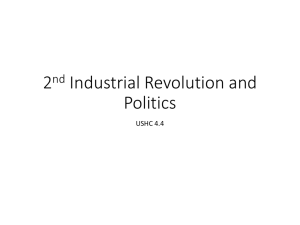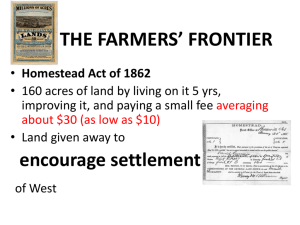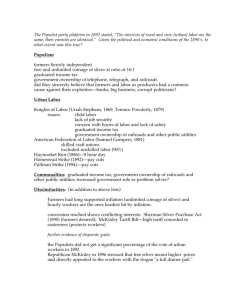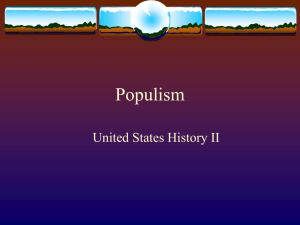Ch.5 Sec.3 Notes
advertisement
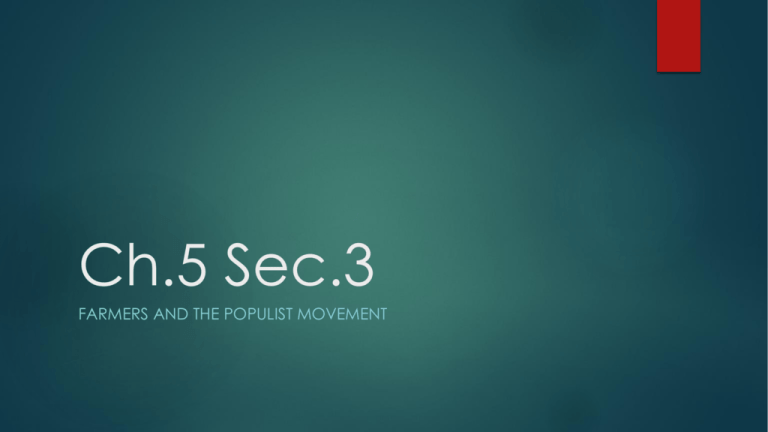
Ch.5 Sec.3 FARMERS AND THE POPULIST MOVEMENT Farmers Unite Late 1800s- farmers were trapped economically Crop prices were falling Farmers mortgaged their farms to buy land to produce more crops (more debt) Railroad were taking advantage of farmers by charging excessive shipping prices Economic Distress Farmers troubles were part of large economic problem in the U.S. Inflation U.S. issued $500 million in paper money during the Civil War----”Greenbacks” Were not worth as much as “hard currency” of the same face value Hard Currency: coins & paper money printed in yellow ink After war, gov. started taking greenbacks out of circulation Problem for farmers Farmers paid back loans in dollars worth more than what they borrowed Crop prices fell: Wheat (1867)= $2------Wheat( 1887)= $0.68 Pushed gov. to put more $ back in circulation Problems with Railroads Paid outrageous prices to transport grain Lack of competition allowed prices to rise Cheaper to send grain from Chicago to England by boat than it was to send grain from Dakotas to Minneapolis by rail Farmers use credit Mortgaged their homes for credit to buy seed, equipment, & supplies Suppliers charged high rates of interest so that items bought on credit cost more than cash purchases Farmer’s Alliances To effectively push for reforms farmers needed to organize Oliver Hudson Kelley- 1867 Started the Grange—social/educational outlet for farm families Taught farmers how to organize against the railroads and sponsor state legislation to regulate railroads Farmers’ Alliances Educated people about low interest rates, loans, and gov. control over railroads and banks Grew to more than 4 million people (south & west) Populist Party Populism- movement of the people 1892 1st convention in Omaha, NB Agenda: lift burden of debt off farmers & give people greater voice in gov. Party Platform Economic Reforms Increase $ supply Graduated income tax Federal loan program Gov. Reforms Election of U.S. Senators by popular vote Single terms for President & VP Secret Ballot 8 hr. workday & restrictions on immigration Panic of 1893 1880s farmers were overextended by loans Railroad markets The construction expanded faster than the Panic Philadelphia & Reading Railroad, Erie, N. Pacific, Union Pacific, and Santa Fe Railroads all went bankrupt People Stock prices fell drastically 15,000 3 traded paper money for gold businesses and 500 banks closed million lost their jobs Silver OR Gold? Political Divide Business owners & bankers (Northeast)—Republicans Farmers/laborers (South & West)--- Democrats Campaign Issue Which metal would be used for money (Silver or Gold? ) 1. Silverites favoring bimetallism—gov. gives gold/silver in exchange for paper currency 2. Gold Bugs (President Cleveland) favored gold standard---back dollars with gold only Hoped to stimulate economy by allowing more $ in circulation More stable/expensive $ Important issue because it would determine if the people’s paper $ was worthless or not 1896 Candidates Republican- William McKinley (Ohio) Democrat- William Jennings Bryan (Nebraska) Campaign ENDORSED BY THE POPULIST PARTY Bryan campaigned in 27 different states No match for $$ backing McKinley McKinley campaigned from his front porch while people traveled the country speaking for him Results McKinley won approx. 7 million votes Bryan 6.5 million votes Electoral college made McKinley the 25th President
